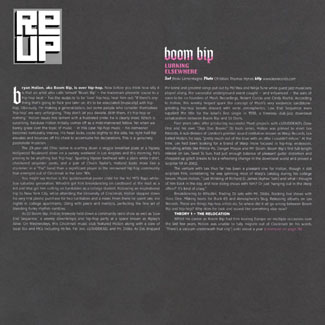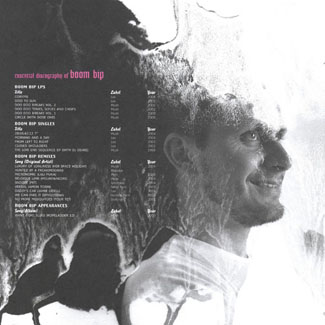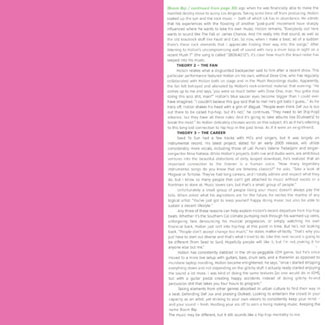


LURKING ELSEWHERE
Bryan Hollon, aka Boom Bip, is over hip-hop. Now before you think how silly it is that an artist who calls himself 'Boom Bip' – the trademark phonetic sound to a hip-hop beat – has the audacity to be 'over' hip-hop, hear him out: "If there's anything that's going to fuck you later on, it's to be associated [musically] with hip-hop. Obviously, I'm making a generalization, but some people who consider themselves 'hip-hop' are very unforgiving. They don't let you deviate. With them, it's hip-hop or nothing." Hollon issues this lament with a frustrated smile; he is clearly irked. Which is surprising, because Hollon initially comes off as a mild-mannered fellow. Yet when we barely graze over the topic of music – in this case hip-hop music – his demeanor becomes noticeably more intense. His head locks, cocks slightly to the side, his right half-fist elevates and bounces off his chest to accentuate his declarations. This is a genuinely passionate musician.
The 29-year-old Ohio native is scarfing down a veggie breakfast plate at a hipless Hollywood Boulevard diner on a sweaty weekend in Los Angeles and this morning, he's proving to be anything but 'hip-hop'. Sporting hipster bedhead with a plain white t-shirt, checkered polyester pants, and a pair of Chuck Taylor's, Holland looks more like a drummer in a "The" band than a significant player in the renowned hip-hop community that emerged out of Cincinnati in the late '90's.
You might say Hollon is the quintessential poster child for the Yo! MTV Raps white-boy suburbia generation. Whodini got him breakdancing on cardboard at the mall as a kid and Visa got him cutting on turntables as a college student. Following an inspirational trip to New York City, while attending the University of Cincinnati, Hollon slapped down his very first plastic purchase for two turntables and a mixer. From there, he spent late, irie nights in college apartments, Djing with peers and mentors, perfecting the fine art of blending funky rhythm rumbles.
As DJ Boom Bip, Hollon tirelessly held down a community radio show as well as 'Low End Sequence,' a weekly downtempo and hip-hop party at a space known as Ripley's Alive. On Wednesdays, this Cincinnati music club featured Hollon along with a slew of local DJs and MCs including Hi-Tek, Fat Jon, cLOUDDEAD, and Mr. Dibbs. As DJs dropped the latest and greatest songs put out by Mo 'Wax and Ninja Tune while guest jazz musicians played along, the successful underground event caught – and influenced – the ears of soon-to-be co-founders of Mush Recordings, Robert Curcio and Cindy Roche. According to Hollon, this weekly helped spark the concept of Mush's very existence: sandstone-grinding hip-hop breaks doused with eerie atmospherics. Low End Sequence even supplied the title for the label's first single in 1998, a timeless, dub-jazz downbeat collaboration between Boom Bip and DJ Osiris.
Four years later, after producing successful Mush projects with cLOUDDEAD's Dose One and his own "Doo Doo Breaks" DJ tools series, Hollon was primed to meet Lex Records. A subdivision of London's premier sound institution known as Warp Records, Lex baited Hollon, he says, "pretty much out of the blue with an offer I couldn't refuse." At the time, Lex had been looking for a brand of Warp more focused in hip-hop endeavors, recruiting artists like Prince Po, Danger Mouse, and MF Doom. Boom Bip's first full-length release on Lex, Seed to Sun, had just enough balance of pleasant guitar distortion and chopped-up glitch breaks to be a refreshing change in the downbeat world and proved a surprise hit in 2002.
The venture with Lex thus far has been a pleasant one for Hollon, though it still surprises him, considering he was spinning most of Warp's catalog during his college tenure. Muses Hollon, "Just thinking of Richard D. James [Aphex Twin] and what I thought of him back in the day, and now doing shows with him? Or just 'hanging out in the Warp office?' It's kind of crazy."
Breakdancing to Whodini. Trading DJ sets with Mr. Dibbs. Rocking live shows with Dose One. Making beats for Buck 65 and Atmosphere's Slug. Releasing albums on Lex Records. These are things hip-hop artists do. So where did it all go wrong between Boom Bip and hip-hop? Why does he look an sound like something else now?
THEORY 1 – THE RELOCATION
Whilst his career as Boom Bip had him touring Europe on multiple occasions over the last few years, Hollon was unable to fully migrate out of Cincinnati (in his words, "There's a vacuum underneath that city.") until about a year ago when he was financially able to make the manifest destiny move to sunny Los Angeles. Taking some time off from producing, Hollon soaked up the sun and the rock music – both of which LA has in abundance. He admits that his experiences with the flooding of another 'post-punk' movement have sharply influenced where he wants to take his own music. Hollon remarks, "Everybody out here wants to sound like The Fall or James Chance. And I'm really into that sound, as well as the old krautrock stuff like Faust and Can. So now, when I make a beat, all of a sudden there's these rock elements that I appreciate finding their way into the songs." After listening to Hollon's uncompromising wall of sound with nary a drum loop in sight on a recent Mush 7" (the song is called "2806:42:12"), it's clear how much the kraut-noise has seeped into his music.
THEORY 2 – THE FAN
Hollon relates what a disgruntled backpacker said to him after a recent show. This particular performance featured Hollon on his own, without Dose One, who has regularly collaborated with Hollon both on stage and in the Mush Recordings studio. Apparently, the fan felt betrayed and alienated by Hollon's rock-oriented material that evening: "He comes up to me and says, 'you were so much better with Dose One, man. You gotta stop doing this solo shit, man!'" Hollon's blue saucer eyes become bigger than I could ever have imagined, "I couldn't believe this guy said that to me! He's got balls I guess…" As he trails off, Hollon shakes his head with a grin of disgust. "People even think Def Jux is too out there to be called hip-hop, but it's not," he continues, "they need to let [hip-hop] advance, but they have all these rules. And it's going to take albums like [Outkast's] to break the mold." As Hollon delicately chooses words on his subject, it's as if he's referring to this long-lost connection to hip-hop in the past tense. As if it were an ex-girlfriend.
THEORY 3 – THE CAREER
Seed To Sun had a few tracks with MCs and singers, but it was largely an instrumental record. His latest project, salted for an early 2005 release, will utilize considerably more vocals, including those of Lali Puna's Valerie Trebeljahr and singer-songwriter Nina Natasia. While Hollon's projects, both live and studio work, are ambitious ventures into the beautiful distortions of dirty, looped downbeat, he's realized that an important connection to the listener is a human voice. "How many legendary instrumental songs do you know that are timeless classics?" he asks, "Take a look at Mogwai or Tortoise. They've had long careers, and I totally admire and respect what they do, but I know so many people that can't get attached to music without vocals or a frontman to stare at. Music lovers can, but that's a small group of people."
Unfortunately, a small group of people liking your music doesn't always pay the bills. When asked what his aspirations are for the future, he recites the mantra of any logical artist: "You've just got to keep yourself happy doing music but also be able to sustain a decent lifestyle."
Any three of these reasons can help explain Hollon's recent departure from hip-hop beats. Whether it's the Southern Cal climate pumping rock through his warmed-up veins, unforgiving fans denouncing his musical progression, or simply watching his own back. "People don't accept change too much," he states matter-of-factly. "That's why just have to start out diverse and that's what I tried to do. Like this next record is going to be different [from Seed to Sun]. Hopefully people will like it, but I'm not making it for anyone else but me."
Hollon has consistently dabbled in the oh-so-peggable IDM genre, but he's since moved to a more live setup with guitars, bass, drum sets, and a theremin as opposed to mundane laptop noodling. Hollon became enlightened, he says, "once I started stripping everything down and not depending on the glitchy stuff. I actually really started enjoying the sound a lot more. I was kind of doing the same textures [as one would do in IDM], but with a guitar pedal creating happy accidents instead of doing glitchy hi-end percussion shit that takes you four hours to program."
Taking elements from other genres absorbed in urban culture to find their way in a beat. Defending Def Jux and praising Outkast. Looking to entertain the crowd in your capacity as an artist, yet sticking to your own visions to consistently keep your mind and your sound – fresh. Hustling your ass off to earn a living making music. Keeping the name Boom Bip.
BEAU LAMONTAGE